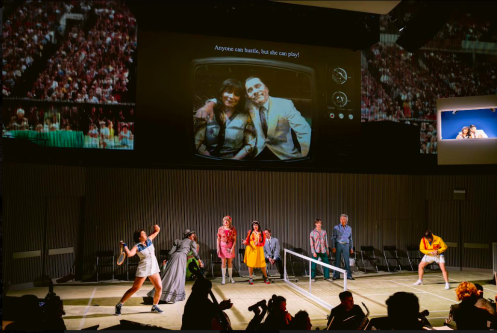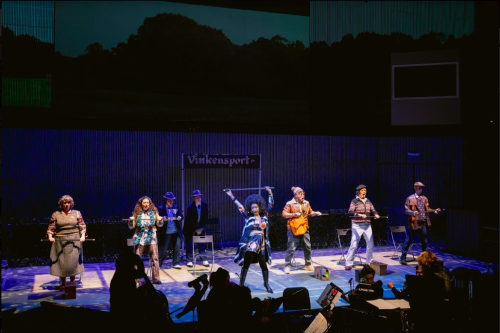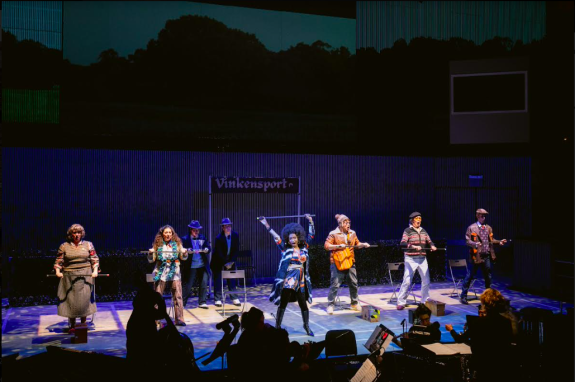 United States ‘Birds & Balls’: Soloists, Orchestra of Opera Parallèle / Nicole Paiement (conductor). SFJAZZ Miner Auditorium, San Francisco, 5.4.2024. (HS)
United States ‘Birds & Balls’: Soloists, Orchestra of Opera Parallèle / Nicole Paiement (conductor). SFJAZZ Miner Auditorium, San Francisco, 5.4.2024. (HS)

Production:
Director – Brian Staufenbiel
Projection – David Murakami
Costumes, Hair/Makeup – Y. Sharon Peng
Lighting – Mextly Couzin
Vinkensport or The Finch Opera
David T. Little (composer), Royce Vavrek (libretto)
Holy St. Francis’s Trainer – Jamie Chamberlain
Atticus Finch’s Trainer – Daniel Cilli
Hans Sachs’s Trainer – Nathan Granner
Farinelli’s Trainer – Chelsea Hollow
Sir Elton John’s Trainer – Shawnette Sulker
Prince Gabriel III of Belgium’s Trainer – Chung-Wai Soong
Butler / Referee – Mark Hernandez
Balls (world premiere)
Laura Karpman (composer), Gail Collins (libretto)
Billie Jean King – Nikola Printz
Bobby Riggs – Nathan Granner
Marilyn – Tiffany Austin
Susan B. Anthony – Shawnette Sulker
Howard Cosell – Mark Hernandez
Rosie Casals – Gabriela Linares
Larry King – Daniel Cilli
The San Francisco Bay Area’s feisty opera company, Opera Parallèle, has a long history of imaginative pairings of modern opera, and its new double bill of lively and listenable contemporary one-acts could not be timelier. Their debut Friday evening turned SFJAZZ’s Miner Auditorium into a tennis court for the world première of Balls, which reenacts the famous ‘Battle of the Sexes’ tennis match in 1973 between women’s champion Billie Jean King and an aging Bobby Riggs, who immersed himself in the role of male chauvinist blusterer.
I was a sportswriter at the time, amused but not surprised when King outplayed Riggs before 30,000 onlookers in the Houston Astrodome (and more than 90 million television viewers worldwide) – a landmark for women’s sports. It changed a lot of minds about the validity of women’s sports and helped set the stage for government legislation requiring equal funding for them in schools.
This week brought another landmark for women’s sports in the United States when the University of Iowa women’s basketball team defeated Louisiana State University in a playoff game. Propelled by charismatic star players and impressive skill on both teams, 12.3 million viewers tuned in to watch, the most ever to watch a college basketball game, by men or women, on ESPN.
Balls, by composer Laura Karpman and librettist Gail Collins, includes many details from the 1973 match, even if the swinging of tennis rackets is mimed without the benefit of the titular balls. We see Riggs fashioning himself as ‘Sugar Daddy’, King’s arrival on the shoulders of a quartet of muscle men in Egyptian garb and a bombastic Howard Cosell narrating from a television booth at ‘the SFJAZZ Arena’, accompanied by tennis star Rosie Casals (sung amiably by Gabriela Linares).
As Riggs, Nathan Granner, who starred in the company’s Everest last year (review here), deployed a hearty tenor and a nonchalant demeanor that belied the character’s anti-feminist pose. Soprano Nikola Printz gave voice to King’s no-nonsense style and captured her physical presence with appreciable accuracy.
The opera also weaves in nineteenth-century women’s rights activist Susan B. Anthony, portrayed by Shawnette Sulker with a scintillating soprano, especially in an aria articulating the aspects of feminism on this occasion. As Marilyn, a member of King’s posse, Tiffany Austin (who has sung with jazz stars Pharoah Sanders and Roy Ayers) lent a legitimately idiomatic style and dazzling voice to the jazz-infused music, ably executed by the small orchestra led by the company’s music director, Nicole Paiement. (Composer Laura Karpman received an Oscar nomination for her score for the recent film American Fiction.)
An apt preliminary scene found Mark Hernandez as Cosell interviewing Paiement and asking if a woman could conduct an orchestra as well as a man. Hernandez played the role of the ring announcer in the company’s mounting of composer Terence Blanchard’s Champion in 2016, seven years before the Metropolitan Opera staged it.

Preceding the tennis opera, Vinkensport or The Finch Opera focused on a much more esoteric sport. Popular in parts of Belgium, it involves training finches to chirp their distinctive birdsong. The winner is the one who elicits the most finch-song in a defined period. The opera’s story, like Balls, aims to reveal a passion for competition and the personalities involved.
Offbeat sports like this were regular fodder for ABC’s Wide World of Sports, a popular U.S. television series in the 1960s and 1970s, and Opera Parallèle framed these two operas as features on the show. The series’ famous tagline, ‘The thrill of victory and the agony of defeat’, became ‘The thrill of victory and agony of de-tweet’. And yes, Cosell did appear regularly as an announcer on the TV series.
The forty-minute piece debuted in 2010 at Bard College Conservatory of Music. Royce Varek’s libretto, which refers to the birds as ‘one-ounce opera divas’, teems with wordplay. The birds’ names, which include Atticus Finch, Farinelli, Hans Sachs and Sir Elton John, are worth a few chuckles themselves. The music leans on flute chirps and bounces with the rhythmic grace of a composer fascinated with the intersection of classical and rock music. David T. Little is chair of composition at Mannes School of Music.
The six colorfully named birds are heard but never seen – they are enclosed in boxes. The trainers ranged from an imperious woman with a team of butlers who deliver martinis to a woman so absorbed in her bird that her aria has her leaving a phone message to an apparently alienated husband.
Each of the six unnamed ‘trainers’ reveal quirks and sorrows as they sing their arias. In an otherwise deftly comedic presentation, all seem to share a loneliness as profound as their love for the birds. Most touching was the final aria, sung by baritone Daniel Cilli (who has covered roles at San Francisco Opera), in a summation of all the personality peculiarities that make these characters outliers.
On a visual level, David Murakami’s projections for both operas used technology to make realistic backgrounds (even on the stage surface). Y. Sharon Peng’s costumes, hair and makeup made the most of details such as the true-to-history looks of the well-known figures in Balls.
Sharp pacing, all the musical colors, nimble comedy and high-level singing made for an entertaining evening.
Harvey Steiman
